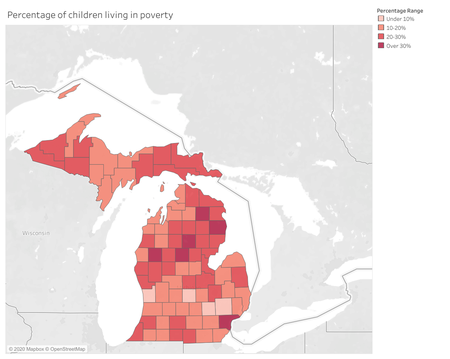Child Poverty is Down in Michigan, But Pandemic Could Worsen Existing Problems For Kids
The annual “Kids Count” report highlights progress and concerns before the health crisis, and could inform post-pandemic policy decisions.

The novel coronavirus pandemic has disrupted the lives of Michigan families in many ways, and could have long-lasting effects on Michigan’s children — their health, safety and economic security, according to a new report.
“Families are having a difficult time, between their wages and the high cost of living, of making ends meet.” — Kelsey Perdue, Michigan League for Public Policy
Since the crisis began, more than 1 million people have filed for unemployment benefits in Michigan. Many parents are working from home. Others, whose jobs are considered essential, must wear masks at work, and keep several feet away from co-workers. It’s hard to find or pay for child care for kids who aren’t in school.
Click on the player above to hear Pat Batcheller’s interview with Project Director Kelsey Perdue on how children are doing in Michigan.
The annual “Kids Count” report from the Michigan League for Public Policy has been tracking those metrics for years. The 2020 report, released April 29, is based on data taken before the pandemic began. See the full report here.
Kids Count Michigan Project Director Kelsey Perdue says while the report doesn’t incorporate the impact of COVID-19, it does show how children were faring before the crisis, and where their biggest needs will be once it passes.

“Though child poverty is down throughout the state compared to ten years ago, the number of families that are struggling to make ends meet has actually gotten greater,” Perdue says.
“It is our fear that this pandemic will surely worsen child abuse and neglect numbers even further.”
Here is how child poverty is changing in Michigan:
- Since 2010, the poverty rate among Michigan children under 18 has fallen from 23.4% to 19.3% in 2018, the most recent year available.But that still means one in five children live in poverty statewide.
- The same is true for southeast Michigan as a region, where the rate dropped from 24.5% to almost 22%.
- In Detroit, about half of kids ages 0-17 live in poverty, though the rate declined from almost 54% to a little more than 47%.
The “Kids Count” report also shows how many children don’t have access to food that’s nutritionally adequate. During the 2018-19 school year, for example, half of all K-12 students in Michigan received free or reduced-price lunches, while nearly a quarter of children under 18 received food assistance benefits.
With schools closed for the remainder of this academic year, Perdue says the pandemic amplifies the food crises families were already facing.
“We’ve seen the importance of food banks and food distribution as schools have closed and as more and more people are losing their jobs,” Perdue says.
Related: Survey Finds Food Insecurity Tops Detroiters’ Concerns During Pandemic
Child Abuse is On the Rise

Perdue says the health crisis could also exacerbate the problems of child abuse and neglect, which were already growing before the pandemic. The report shows that from 2010 to 2018, the number of kids living in families that were investigated for abuse and neglect rose almost 72%. At the same time, the number of confirmed victims was up almost 34%.
“It is our fear that this pandemic will surely worsen child abuse and neglect numbers even further,” Perdue says.
The data also show more young children and young adults are dying, though the rate of deaths among 15 to 19-year-olds has dropped since 2010. The same age group saw a dramatic decline, 48%, in teen births.
Some Progress
Not all the news is bad.
Perdue says more students are graduating on time, and nearly every child in Michigan had some form of health insurance in 2017 through the Affordable Care Act and the Healthy Michigan Plan. She says a federal court struck down work requirements that would have jeopardized coverage for hundreds of thousands of Michigan residents.
“Also, asset limits were raised last fall that will allow more and more families to access key programs like food assistance to help meet their families needs,” Perdue says.
She also cited a significant policy win in criminal justice reform. Under a new Michigan law, 17-year-olds who are charged with crimes will no longer be automatically treated as adults.
“Raising the age to 18 was the culmination of years of hard work from lots of advocacy groups, parents, and criminal justice reform advocates across the state,” Perdue says.
Trusted, accurate, up-to-date
WDET is here to keep you informed on essential information, news and resources related to COVID-19.
This is a stressful, insecure time for many. So it’s more important than ever for you, our listeners and readers, who are able to donate to keep supporting WDET’s mission. Please make a gift today.
